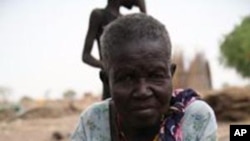South Sudan has shut down a leper colony outside Juba, long a refuge for the sick and vulnerable who are now finding themselves squeezed out of a booming capital in the world's newest country.
Dr. Joseph Wani carefully writes down the name of every person suffering from the affliction at the Luri Rokwe leper colony. Like others here, his twisted and gnarled fingers and his right leg have not been spared by the disease. Wani came here in 1948, when Sudan was ruled by the British, and fears over public health chased the lepers to the colony.
South Sudan split from the north last July after decades of civil war, during which this community survived on handouts, the care of Wani, and the growth of its own food.
Joseph Wani says there are almost 300 lepers living here, and about 1,000 of their children who were born and raised here.
But casting his eyes around the piles of rubble that were treasured homes just weeks ago, Wani fears the majority will have to leave this safe haven, which was demolished as part of a land allocation program.
“These are no houses," he said. "They are living under the trees, even some are living in the open places, because nowhere to go, and they are waiting for demarcation, for the land to be given to them."
A few small aid agencies still help the community, but Wani says proper programs stopped a few years ago.
The community also lost its cultivation land in 2005, when a peace deal was signed and the southern liberation army returned from the bush to set up its base here.
It is now prime real estate on the outskirts of the capital. But only 222 plots have been allocated to those from the colony, meaning the rest may be cast out of the only home they have ever known.
|
Key Facts About Leprosy
|
Dr. James Wani, who runs leprosy programs at Juba Teaching Hospital and is no relation to Dr. Joseph Wani, says he is aware of two leper colonies in Central Equatoria state with about 1,400 people with leprosy.
The Ministry of Health could not provide a figure for how many people have leprosy in South Sudan’s 10 states.
James Wani believes most cases are hidden due to the shame and ignorance surrounding the disease, which can be cured within six to 18 months with the right drugs.
“The people of leprosy, they do not know that leprosy is an infectious disease and can be treated," said Wani. "They only know that leprosy is a curse, so when you have leprosy you are cursed, so that is why people are afraid to come out. But during our awareness, that is when they come out.”
He says people with leprosy from other states have come to the capital thinking they will find better treatment and understanding, but do not have the right papers to be allotted land.
The South Sudanese scouts have pledged to rebuild 47 homes of the most afflicted, but work has yet to start and the rains are just weeks away.
Aid agencies that donate food and hospital staff that have treated these people for years are worried about the health risks to this population if people are still living outside in the rainy season.
Aid worker Lori Bryan has been coming to the camp for years to help this community, and now fears for the survival of what she calls “an extremely vulnerable population”.
“Now the rains are going to be coming into Juba, and they have nothing to rebuild with, they have no money and they have no way to grow vegetables because they do not have any land," Bryan said. "So you already have very skinny people, very difficult for them to get water, that are now going to become more diseased and more thin and frail, that leads to more health complications and possible death.”
But back at the colony, Pastor Tombe Nasona, a child of leper parents, translates the grievances of his neighbor Elizabeth Kadia, who says there is a serious lack of food, shelter and water.
“We are left here, like we are just in a desert, nobody concerned with us," Kadia said. "Most of us did not receive land, and wind is blowing hard against us. We have nowhere to go because I am born here, all my parents met here, I was born here, grew up here, even made my family here, so I have nowhere to go.”
The government recently halted another demarcation program after violent clashes killed seven people and stoked tribal tensions as communities battled it out for land in Juba, Africa’s fastest growing capital.






